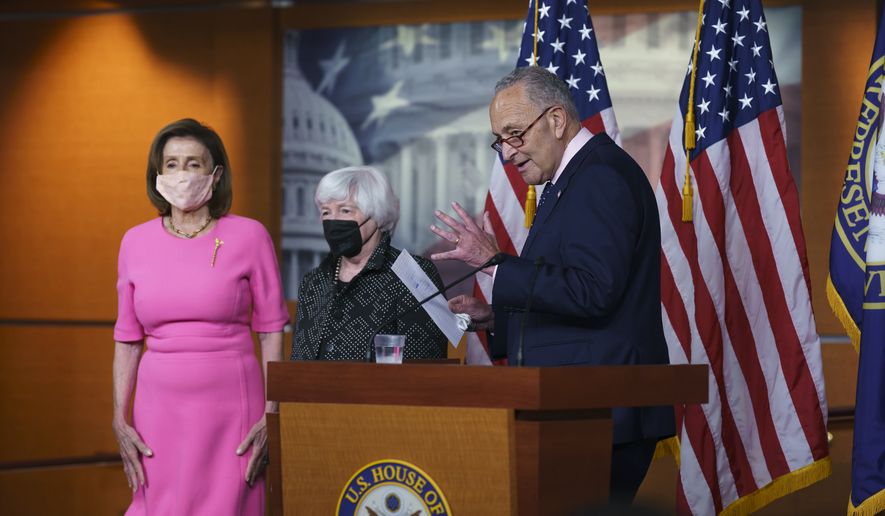Senate Majority Leader Charles E. Schumer announced on Thursday that the White House and Congressional Democrats have agreed on a broad “framework” of tax hikes to pay for President Biden’s $3.5 trillion expansion of the federal safety net.
Mr. Schumer, New York Democrat, said during a Capitol Hill press conference that tax increases needed to pay for the massive social welfare package were finalized. Mr. Biden has been huddling with Democratic leaders this week on the legislation.
“The White House, the House and the Senate have reached agreement on a framework that will pay for any final negotiated agreement,” he said. “So the revenue side of this, we have an agreement on.”
Mr. Schumer refused to give a dollar figure for how much revenue would be raised by the proposed tax hikes.
“There’s still a lot of things we got to do, but this is an important step,” he said. “There will be enough ’pay-fors’ to [fund] the final agreement.”
Democrats are pitching the $3.5 trillion spending bill to voters as “human infrastructure.” They say the package complements the $1.2 trillion bipartisan infrastructure bill that focuses on roads, bridges, railway and airport projects.
The bigger bill amounts to a wish list of liberal priorities such as proposals for climate change, amnesty for illegal immigrants, tuition-free community college and expanded health-care programs.
To pay for the program, House Democrats have proposed 40 new tax hikes, impacting corporations, the wealthy and average individuals. The menu of hikes ranges from doubling the federal tobacco tax to more than $2 per pack, to boosting the top income tax rate to 39.6% from 37%, adding up to one of the largest tax increases in U.S. history.
Rep. Richard Neal, Massachusetts Democrat and House Ways and Means Committee chairman, said that much of the House proposal was likely to make it into the final framework.
“We’re still talking about it … but it’s in [there] at the moment,” he said.
Given Republicans’ solid opposition, Democrats plan to pass the $3.5 trillion package via a special process known as budget reconciliation. It allows some spending and tax measures to avoid the Senate‘s 60-vote filibuster threshold and pass with a simple majority of 51 votes.
Since the Senate is evenly split between both parties, any single lawmaker can exert significant influence over any piece of legislation.
At the moment, two moderate Democrats, Sens. Joe Manchin III of West Virginia and Kyrsten Sinema of Arizona, are doing exactly that. The duo has called for trimming the $3.5 trillion package and its proposed tax increases.
Mr. Manchin, the chairman of the Senate Energy Committee, is also opposed to repealing tax subsidies for the fossil fuel industry — a favored cause of far-left Democrats.
It is unclear whether both Mr. Manchin and Ms. Sinema will support the tax framework that has been agreed to by the White House and Democratic leaders.
“We have seen nothing and have not signed off on anything,” Ms. Sinema’s office said in a statement Thursday.
• Haris Alic can be reached at halic@washingtontimes.com.




Please read our comment policy before commenting.